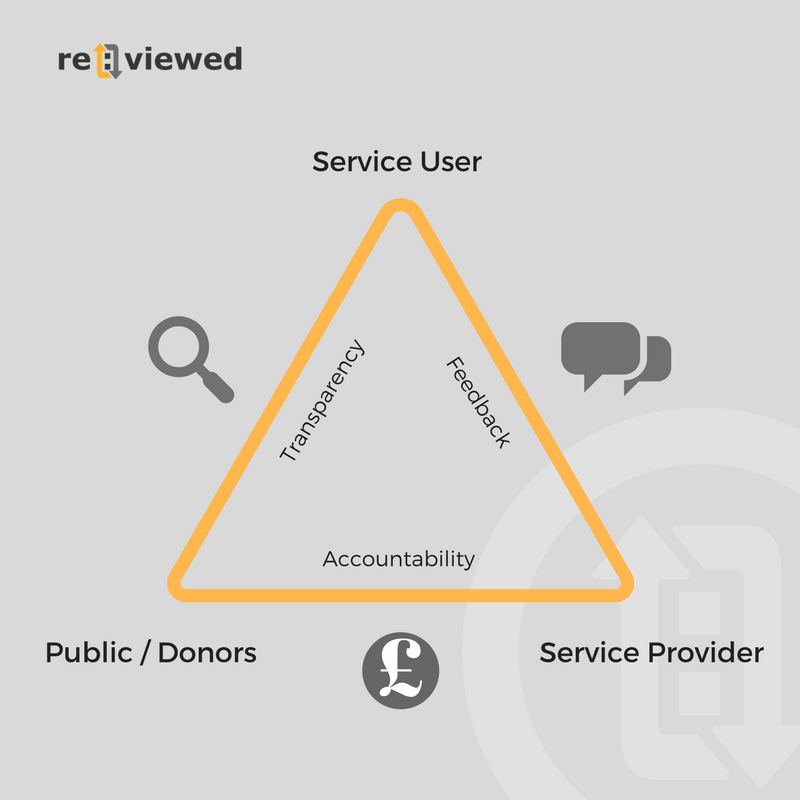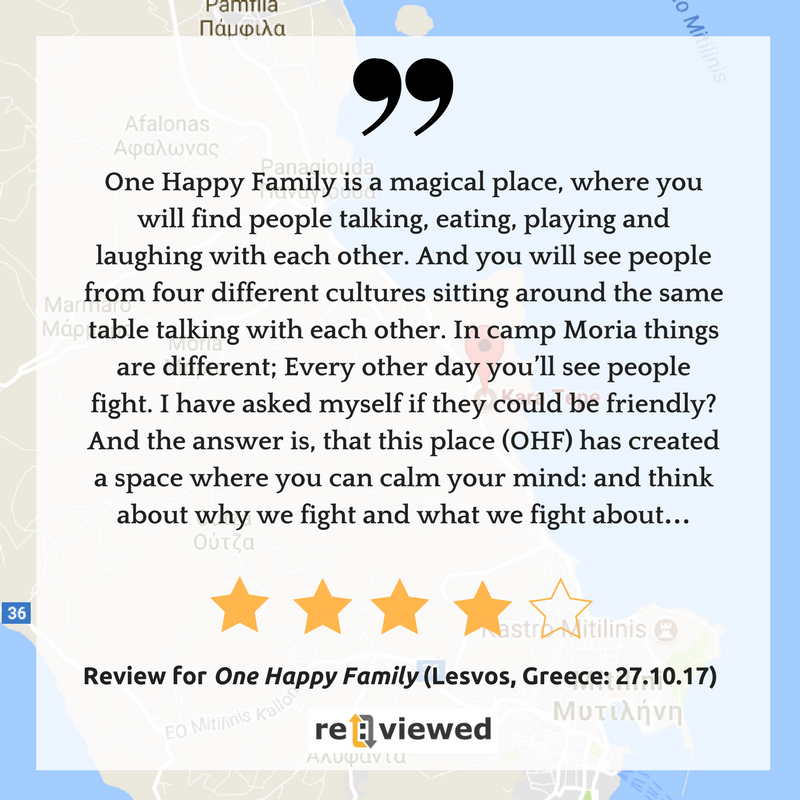Giving a voice to humanitarian aid service users
The work of re:viewed
Tina Mason is creating an online platform that gives a voice to the often silenced service users of humanitarian aid, to increase transparency and accountability, and inform giving.b
By Rute Costa
Tina Mason has an idea that could revolutionise the humanitarian aid sector. She believes that by giving a voice to service users, her reviewing platform re:viewed can support the improvement of the humanitarian services provided to them. According to the Global Humanitarian Overview, 2018 will see more than 135 million people across the world requiring humanitarian assistance and protection. re:viewed comes at the right time to elevate the voices of these people and help humanitarian aid suppliers, from INGOs to grassroots organisations, become more transparent, efficient and cost-effective.
I ask Tina how the idea for re:viewed first occurred to her. “It came together when I was researching my masters thesis [in Human Security]”, she tells me, “I’d recently had a child and I couldn’t travel to do a field research project.[…] When I was trying to find service user feedback about humanitarian service providers in order to compare services, I found it just wasn’t available. This was when the penny dropped”. Tina realised she had never heard feedback from service users themselves – refugees, crisis affected, displaced people. Her experience working in donor accountability with an INGO in South Sudan then informed the crucial question: “How are we being accountable to service users?”. The reality is, we aren’t. re:viewed wants to change that.
The ultimate goal is, in Tina’s words, “to support the improvement of services that are provided to people who need humanitarian assistance”. Through providing a platform where service users can express “independent and anonymous” feedback, making it available to organisations and the public, re:viewed wants to increase accountability and transparency, as well as to inform giving. Tina argues that if there is such a thing as donor accountability, where humanitarian agencies are accountable to donors for how funding is spent, the same should be true of service user accountability: both organisations and donors should be accountable to service users for the quality of the services they facilitate. By having access to a platform where feedback from service users is available, donors can make an informed decision about where to direct their help.
“How are we being accountable to service users?”
At the moment, Tina explains, information about what really is being experienced by humanitarian aid users is often remote and clouded. “Who’s mediating it?” she asks, frustrated. The picture of the refugee crisis has been twisted and turned in multiple directions by the media, and access to direct information from the source is scarce, often non-existent. On the rare opportunity service user feedback is available to the public, it has been mediated by the organisations that collected it, either in the form of selected stories, or through very simplistic “yes or no” surveys. Tina expands on this: “what you generally see and hear are the large organisations when they’re making their appeals. The information they provide is very rarely the perspective of service users, that’s just never part of their PR. Then there are organisations that rank NGOs, but service user perspectives are omitted from their evaluation criteria”. There is no wide-reaching platform for beneficiaries of humanitarian aid to autonomously express their views and tell their stories. re:viewed is carving out the space for it.

Tina explains re:viewed could influence the way service users are seen by rebalancing power and giving substance to discussions around accountability: “I think it’s not discussed enough. There’s a kind of passivity assumed about service users. […] There needs to be a re-understanding of agency and of power. re:viewed could help support that by elevating what people are saying and by using this to inform giving. It’s an accountability mechanism that actually has the ability to ‘hold’ to account”. Currently, service users who speak about their experiences in refugee camps are not empowered, they’re at risk. Tina recounts examples shared with her when users were asked to give feedback to NGOs, but were not ensured anonymity: as a result, they were exposed to the point of nearly losing jobs and services.
So how exactly does re:viewed intend to change the game? Tina explains they want to offer two types of reviews to service users. Specific reviews are directed at a particular service provider who has opted in to receive feedback: “It’s up to us to build the relationship with the organisation and to support the way they communicate with the reviewer. This would include helping to facilitate feedback, supporting them to placere:viewed within a wider accountability effort and guiding their responses to ensure the feedback loop is closed and recommendations are actioned”. Such reviews could be particularly beneficial for grassroots organisations, which are mostly dependent on donations from the public. re:viewed is expecting many positive reviews which could really support the important efforts of smaller organisations that are less likely to be household names.
“There’s a kind of passivity assumed about service users. […] There needs to be a re-understanding of agency and of power. re:viewed could help support that by elevating what people are saying and by using this to inform giving.”
General reviews, on the other hand, offer users the chance to explain their experience of a camp or area where humanitarian aid is being provided. Because these are not targeted at a specific organisation, and sometimes address multiple service providers, they would be more difficult to follow up with remedial actions. However, a database of general reviews, Tina tells me, could work as an advocacy tool: if there were complaints of poor conditions in a particular camp over consecutive years, these accounts could have the power to encourage and inform change.

All reviews are anonymous to protect user identity, and minimally mediated by re:viewedto ensure that individual members of staff remain protected. The benefits of re:viewedseem undeniable, so I ask the founder why she thinks there isn’t a platform like this in place already. “I don’t think something like this happens easily. I think it happens with a little bit of a fight”; and “there are challenges”, Tina adds. INGOs have got back to re:viewed with concerns that frontline staff or local partners would feel under scrutiny if service users were being asked for reviews at the request of headquarters. Similar accountability platforms have existed, but they were internal initiatives of given organisations, complicating the independence of such a tool, and disabling analysis across organisations. For big NGOs, Tina explains, “real accountability means real change”, it requires a restructuring that makes all levels of the service providers (not just the people on the ground) accountable to service users and local communities, and answerable to their feedback. By encouraging all-encompassing transparency between users, providers, and the public, re:viewed is igniting that movement towards change.
When approaching organisations that are reluctant to take part, Tina says, the “typical response we receive is that reviews may not reflect nuance, or provide the full-picture on humanitarian-aid”. Whilst Tina agrees this is true, she also has measures in place to address it. re:viewed believes that by “providing space for organisations to reply and clarify what’s going on with their services, you start to build a contextual picture that should lead readers to have a balanced view about what they’re reading”. re:viewed wants to work with organisations to aid and improve their services, not against them. That is why they are looking to train facilitators who can liaise with NGOs and grassroots partners on the ground, and guide them through the process of reviewing.
“re:viewed wants to work with organisations to aid and improve their services, not against them.”
re:viewed is fizzling with potential, and Tina knows it. She is driving the project forward with a strong passion, believing that it can bring about real change. The goal is to become a valuable “information source, to compare and to make decisions on different aspects of humanitarian assistance”. In order to get there, Tina is seeking to gather the financial resources, volunteers, and technical team re:viewed needs. “Our starting point is Greece and we are on the lookout for organisations that would be happy to come on board”, she adds. If you think you have something to offer, reach out and join re:viewed in their fight to “improve services, and improve expectations of services”.
